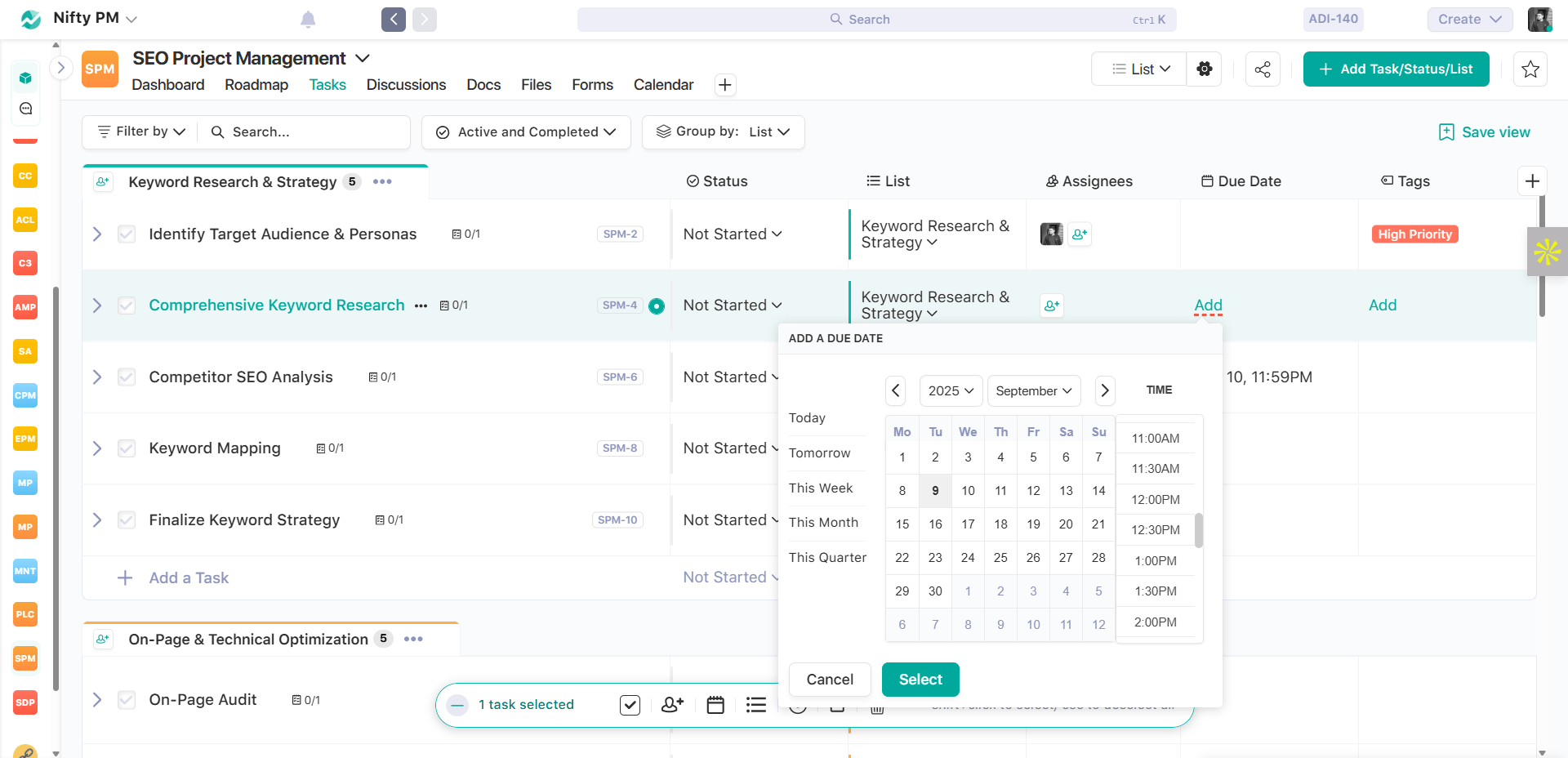Are your competitors outranking you? What does it take to make it to that coveted top spot on Google? Shoot, what if you’re not even showing up on the first page of results? Improving your organic search rank is critical for achieving your business goals and SEO project management is what makes it possible to get to that promised land of SERPs.
The benefits of having an effective SEO project management plan
Enhance productivity. Improve efficiency. Streamline workflow. Have more confidence in your content. Hit KPIs.
Effective SEO project management for your digital marketing efforts is huge. Ranking high in the SERPs is rarely achieved by chance, it takes a concerted and coordinated plan. Having a strategic plan means your team members are all working towards a common goal. Everyone knows their role and responsibilities in the optimization process.
SEO planning helps you define SEO goals — increase conversions, generate more organic traffic, boost backlinks, etc. — and the scope of the work you’ll need to do to get there. It also allows you to identify key stakeholders and the budget to get things done. A proper SEO project management plan means breaking things down to the day-to-day. What are the deliverables? Who’s doing keyword research? Is technical SEO being addressed in tandem? Do you need to bring on freelancers to tackle particular project tasks?
You wouldn’t build a website without a plan, treat your SEO strategy the same.
Who should be in charge of SEO task management?
Simply put; an SEO project manager.

No need to overcomplicate it, there are folks out there who are specialized in this exact skill and passionate about getting results. In a nutshell, an SEO project manager helps you achieve all those benefits mentioned above in a set timeframe. They assess where you currently are and create specific projects within a revamped content strategy to move you to where you want to be, assigning SEO tasks facilitating team collaboration along the way.
Find yourself a good one of these and say hello to search engine success.
Learn (or hire for) the key skills of an SEO project manager
So clearly a lot goes into getting SEO right and nailing it can be huge for business.
How?
Consider this: 53.3% of website traffic comes from organic search according to research by BrightEdge.

Backlinko adds that the #1 result on Google has an average CTR of 31.7% — 10 times more than the #10 result. Perhaps most importantly, people rarely go to page 2 of the search results. Just consider how often you yourself go past the first page.
Given that, learning SEO skills or identifying them in a potential hire is imperative.
An understanding of SEO workflow and task management
Yep, search engine optimization has its own workflow. An SEO campaign is built with purpose and effective execution requires someone who understands the required steps. From research and analytics to website content planning and creation to technical SEO, there’s more to the game than writing and posting.
That’s where task management for SEO comes in. A manager needs to be able to delegate tasks in pursuit of the project goal.
Organization and planning
The project plan isn’t going to develop itself. An SEO project manager needs to not only organize the various tasks but also ensure the plan adheres to the overarching marketing strategy.
There are a lot of moving parts to the SEO grind; initial content audits, keyword research, competitive analysis, outreach for link building — including cold email outreach — copywriting, Google analytics, developing messaging, etc.
The ability to organize and plan all of that is vital.
HTML and CSS knowledge
You don’t need your SEO guy or gal to be a pro web developer but HTML and CSS are important tools in the SEO belt. The basics of HTML like tags, headers, meta descriptions and linking are significant for SEO. Understanding CSS can help make your website easier to crawl and index.
Tools for SEO and project management
Project management is the art of overseeing tasks and directing them towards a goal. Planning tools help immeasurably with that and we’ll dive into the best of the bunch for project management below, think: Trello, Asana, Basecamp, Monday.com, etc.
On top of that, a manager should be in the know on other tools teams may use to improve productivity, like Gmail, Slack, Google Docs, Dropbox and Google Drive among others. Add to that Excel or Google Sheets for creating a website content inventory or workbook to track progress and content gathering tools and you’ve got quite an ecosystem on your hands.
As far as those tools for collecting content go, GatherContent is well known but there are plenty of GatherContent alternatives that are well worth a look.
As for SEO tools, there’s a boatload that can make a big difference, to name a few though:
- Ahrefs for keyword research
- Google Search Console for deeper insights to be used in tandem with Google Analytics
- SEMrush is an SEO-focused SaaS tool for your PPC content marketing campaigns
Lastly, a big part of any SEO project is planning the content itself. Do yourself a favor and make sure that whichever software you use is among the best content planning tools available.
Leadership, communication and collaboration
A project manager is a project leader and to be successful a leader has to be able to create a collaborative atmosphere.
Open communication between and among the SEO team and others in your company or operation is essential. It ensures that the appropriate steps are being taken, allows for feedback to flow and creates an environment of accountability.
Analytics, metrics and reporting
What you don’t know can hurt your SEO prospects. Blindly guessing what keywords matter or the relevant trends is a recipe for wasting time and money. Especially since analytics and metrics are so easily accessible. Your SEO guru should be well versed in understanding these reports and implementing the findings.
SEO writing and editing
As with HTML and CSS, your SEO ninja doesn’t need to be Hemingway — your writer probably shouldn’t be either actually, Hemingway was sparse with words, SEO content tends not to be. Having basic copywriting and editing skills helps in everything from creating outlines to spotting issues in the content.
🎬 Learn what Slickplan can do!
We filmed a short video to show you exactly how to use Slickplan
Here’s how to manage SEO projects
Whether you hire a manager, have an internal SEO expert or intend to learn the skills, there’s a basic framework for managing an SEO project.
Set a goal
Your goal defines everything that comes after and without one you’re just wandering aimlessly, hopped up on hopium. Goals let you set the scope and timeframe of the project and make your actions measurable. They should be specific like; increase clickthrough by 5% or move up to the top 5 search results.
Research
Once you’ve set your objectives, it’s time to get in the weeds. That means things like competitor analysis, keyword research (including longtails) and an internal audit of your own content to see if what you have that can help and what’s missing.
Define and assign tasks
After you do your research on the strategic side, you can move on to divvying out the rest of the tasks. Creating outlines, assigning a writer to research and create each individual piece, decide who will edit. Who will handle the technical SEO? The design of the article if it needs it? After all that, it’s on to promotion via social media and the like. Everything’s important en route to that rarefied search result air so make sure you assign the right people for the jobs.
Also, it’s wise to have some sort of time tracking mechanism in place so you can stick to a schedule and push things forward faster.
Analyze and adjust
How’d it go? Did you reach your goals?
Taking time for reflection and analysis is an integral part of an SEO project, as well as measuring your results against the benchmarks you set. Adjust as necessary and start the next phase.
Understand common SEO project management problems and how they can be solved
Optimizing SEO isn’t a breeze, if it were, you wouldn’t be reading this article.
Here are some problems to consider when bringing in an SEO project manager or if doing it internally.
Mismatch between expectations and reality of SEO projects
This is a biggie. SEO improvements don’t happen overnight, they’re incremental. A common pitfall is not understanding or discussing time horizons and what constitutes success.
A project manager will develop a long-term, multi-faceted strategy to carry you up the ranking ladder, generally one rung at a time. Like water on the stovetop, it doesn’t boil the second you turn the heat on, it’s each additional degree that eventually gets you there.
There’s no set in stone amount of time to see SEO results but you should expect 4 to 6 months at least. The solution here is to properly vet the manager and then play the waiting game.
Targeting issues
This can be both targeting the wrong audience or wrong keywords.
Targeting the wrong audience is an issue with your research and a fundamental misunderstanding of your users. This ends up having a cascading effect on everything from the content you produce to the keywords you target. You may still attract an audience…but chances are your conversions will suffer because of that mismatch.
In terms of keywords, the problems go beyond potentially targeting the wrong ones. If you’re only targeting highly competitive keywords that you have very little chance of ranking on, your results are going to suffer. Keyword variation and long tail keywords need to be incorporated.
Underdeveloped off-page SEO
On-page SEO is everything on your site that plays into SEO ranking, off-page is the rest and there’s a main point of intersection: links. Link building, or getting backlinks from other sites to your content, gives your site authority. If the content you’re developing isn’t worthy of a link, it’s going to be difficult to boost your SEO.
The better your strategy, research and competitor analysis, the better your content will be which will lead to more links.
Utilize SEO project management tools
What would we do without project management tools? Remember sticky notes that quickly lost their stickiness? Notes and feedback buried in unchecked notebooks? Endless email threads for every action item? That was a ball.
Modern problems require modern solutions and managing SEO projects — and really any other projects — with software removes so much unnecessary complexity from your workflow. Ease of accessibility means you can collaborate with your team no matter how far-flung they are. Accountability is built in because you can see each stage of the project, and who’s responsible, laid out in front of you. That means projects stay on the proposed timelines.
You don’t need to use every platform, but if the goal is to work smarter, it’s best to incorporate some of the top management tools.
Which SEO project management software should you use?
It’s not necessarily an “or” proposition, you can use as many project management and team collaboration apps as necessary. Keep in mind though, the point is to streamline workflow, not muddy the water by adding all the apps and software because all the other companies are doing it.
Choose the ones that have the functionality you need, skip the rest.
Trello: (best for small teams and simplicity)

C’mon kanban! Trello is an incredibly user-friendly option with a learning curve that’s basically nonexistent. The kanban board — columns representing progress and cards cascading beneath that are the tasks to be completed — makes project management and understanding progress painless. The UI is crisp and clean as can be.
Once a task is completed, your team member just drags and drops the card in the next column where it’s picked up by whoever’s assigned. Each card has a built-in comment section so notes, feedback and chats (and memes probably) stay together and on topic. Documents can be uploaded to individual cards and adding deadlines takes a couple of clicks.
Monday.com: (best SEO task manager)

Monday.com is trusted by some of the biggest brands on the planet for project management and there’s a reason for that; it’s a great tool for SEO task management and creating custom workflows. A workflow that suits your team’s needs will naturally lead to better teamwork.
The user interface is simple but deceptively powerful with multiple viewing options like kanban, calendar timeline and more to see your project’s progress in whichever way makes the most sense to you. A ludicrous amount of templates help you get started in seconds and 5 levels of pricing make this an option for everyone from freelancers to marketing agencies.
Nifty: (best for agencies handling multiple SEO clients)

Nifty gives SEO teams a unified workspace to plan campaigns, manage tasks and share files. Boards, milestones, timelines and docs keep work organized and visible.
You can manage projects in whichever view fits best, including Kanban, Gantt, calendar and table. Built-in time tracking, custom workflows and milestones help keep campaigns on schedule. Team chat and threaded discussions keep approvals and updates moving without email sprawl.
Asana: (best for complex projects and larger teams)

Similar to Monday.com, Asana is packed with a ton of viewing options that allow you to quickly track team and individual progress. You can keep complex tasks organized and your team accountable with a to-do list approach and an interface that makes it easy to understand who’s doing what.
Asana has far more advanced features than Trello, with which it’s often directly compared. A notable one is Workload, a hugely beneficial tool for larger teams that lets you actively manage, well, individual workload and adjust accordingly. Asana also boasts seemingly endless integrations, including with Trello (and vice versa).
Basecamp: (best for collaboration and remote teams)

Also a great option for large teams, Basecamp is a tool that packs quite a punch. It combines all the things you need into one workspace; task management and scheduling, real-time chat, file storage and more.
Automatic check-ins are recurring questions that you can schedule to see where your team is with each task. The group chat and message board centralize communication and bring a Slack-like feature to the mix. Basecamp is among the oldest project management tools out there, a real OG, and its reputation for getting the job done is well deserved.
Flowlu: (best for project management and team/client collaboration)

Flowlu brings together project planning, task management, and client collaboration in one platform — a great choice for SEO agencies managing multiple campaigns. Teams can visualize progress with Kanban boards, Gantt charts, and task lists, ensuring everyone stays aligned from kickoff to delivery.
Automations simplify repetitive actions like task assignments and notifications, while built-in chats and comments make it easy for teammates and clients to communicate in real time. Affordable pricing makes Flowlu accessible for freelancers, small businesses, and larger agencies alike.
Download our free SEO project management template
While we recommend using one of the above software tools to manage your SEO projects — we’re on that Trello grind — it never hurts to consider other options. Plus spreadsheets are free.
Try our free SEO project management template, all you’ll need to keep things in order. To use this template follow the instructions below:
- Click to open the SEO project management template in Google Sheets
- Choose File > Make a copy to save to your own Google Drive
- Or select File > Download > Microsoft Excel (.xlsx) to download

Plan smarter content with Slickplan
A collaborative workspace to handle all your content needs. Plan, gather and create together.
Key takeaways on SEO project management
The critical point to walk away with is that SEO is a directed process, not one that happens by chance. Just like the gym, gains come from continuously compounding effort. Working out once won’t get you a result, similarly, writing one keyword-stuffed page won’t boost your SEO ranking.
To see real improvement it’s wise to consider bringing in an SEO project manager who understands the ins and outs of search, knows the methods to improve it and has well-developed leadership qualities. Empower them, or a qualified internal team member, to create and manage your SEO projects.






 X
X

